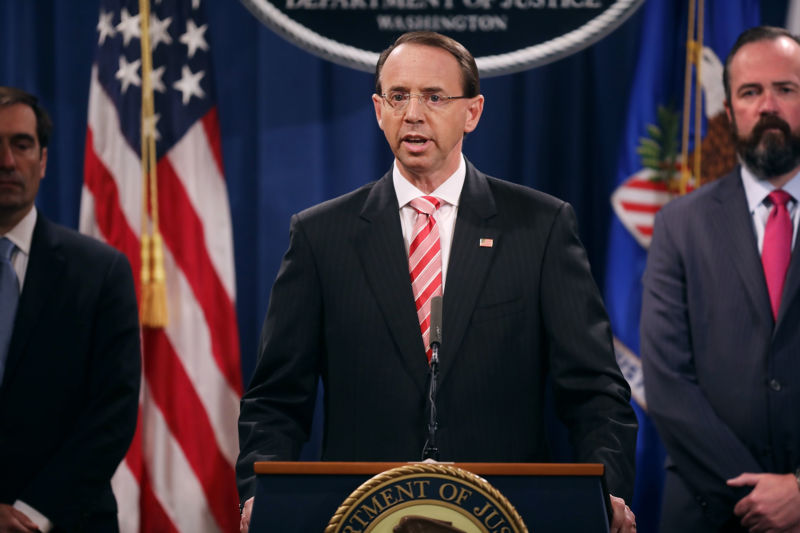After Indictment, Russian Hackers’ Lives Changed Forever, Ex-Ambassador Says

On Friday, the Office of the Special Counsel handed down an indictment of several Russian intelligence officers that federal authorities say were critical in the operation to sway the 2016 presidential election.
Given that the United States lacks an extradition treaty with Russia and that the defendants are unlikely to have many Stateside assets, what meaningful effect does going through the motions of a prosecution have?
Experts say that there are a few primary objectives to this type of indictment: first and foremost, the indictment is likely to make the defendants’ lives harder if they ever want to leave Russia. Countries that do have an extradition treaty with the United States will now be on notice in case any of these guys show up. A secondary objective is to alert both the American public and the Russian government just how much the Special Counsel knows.
Lawyers and former government officials were quick to point out on Twitter that by naming names, the lives of the 12 named Russians will never be the same again.
As Michael McFaul, the former American ambassador to Russia under the Obama administration, put it:
Those indicted Russians can now be arrested all over the world. No more trips to London or French Riviera. Their lives just changed forever. https://t.co/fuDi7pWukS
— Michael McFaul (@McFaul) July 13, 2018
The United States has been known to have hacking suspects arrested in countries ranging from the Maldives to Thailand and has also tried to lure those believed of wrongdoing to far-flung American territories like Guam. American authorities could also issue an INTERPOL red notice for their arrest.
“Although it’s true that today’s indictment is unlikely to lead to arrests or other legal consequences for the named individuals, the indictment will lead to very real consequences for the individuals, most directly by limiting their ability to travel internationally, on vacation or otherwise, because of the risk of arrest,” Austin Mooney, a Washington, DC-based attorney, emailed Ars.
“Restricting these individuals’ ability to travel internationally will lead to spillover effects in the Russian intelligence community, making it harder for the impacted agencies, in particular the GRU, to recruit top talent within Russia and shifting interagency politics against them. This is one reason past indictments charging Chinese officials for commercial cyber-espionage were widely considered to be a successful deterrent, despite failing to lead to actual arrests.”
According to Jean-Jacques Cabou, a white-collar criminal defense lawyer based in Arizona, Special Counsel Robert Mueller is laying his cards on the table by putting everything in an indictment.
“So, by indicting, the prosecution can put into the public domain the facts and/or allegations found by the grand jury to be supported by probable cause (that’s a low standard, but that is the standard in question here),” he emailed Ars.
“Here, the public at large may be one intended audience. But prosecutors also unseal indictments to send a message to other targets/subjects that the investigation is pushing ahead. Targets and subjects who have concerns about their own exposure might now be reevaluating their own positions including, for example, whether they should consider cooperation with the government in the hope of receiving favorable treatment, for example via a plea agreement, deferred prosecution agreement, or non-prosecution agreement.”
Similarly, Julie Sirrs, a former intelligence officer with the Defense Intelligence Agency who now works as a lawyer in private practice in Montana, told Ars that such an indictment illustrates publicly what level of detailed investigation has already been undertaken.
“Perhaps most importantly for the near term, [indicting suspects] makes it that much more difficult for anyone to claim the investigation is a ‘witch hunt,'” she emailed. “The timing just shortly before Trump meets with Putin is also likely not a coincidence.”
However, other experts are not in favor of using the American criminal justice system in this fashion. One of those, notably, is Jake Williams, a former member of the National Security Agency’s hacking unit. On Friday, he wrote:
For all my fellow US citizens pointing out that Russia committed espionage and we should charge them, don’t be naive – we hack too. And it largely keeps you safe. When the first US gov hacker is charged and/or arrested I can’t wait to watch you change your opinions.
— Jake Williams (@MalwareJake) July 13, 2018
READ MORE HERE

